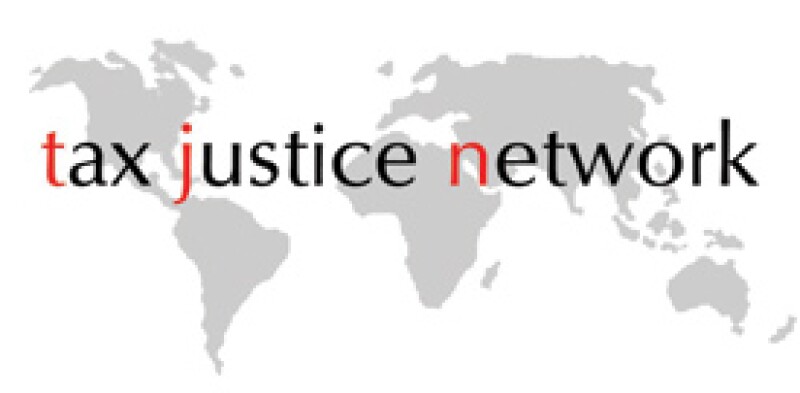
|
Tax Justice Network cofounders Richard Murphy and John Christensen were also in the Global Tax 50 2013, 2012 and 2011 |
The Tax Justice Network (TJN) is a campaigning body led by John Christensen which advocates fairer tax policies around the globe, particularly to benefit developing countries, and global tax transparency advances in 2014 represent a huge feather in the TJN's cap. Now in its 11th year, it carries out research and analysis of international tax policies and financial regulations and is a staunch opponent of tax evasion, aggressive tax avoidance and the use of tax havens.
One of TJN's key areas of focus over the past year has been ensuring that developing countries have a seat at the debating table during tax-related international negotiations.
The approach has drawn attention to the lack of non-OECD representation, and TJN can perhaps be credited with pressuring the OECD into including 10 developing countries including Albania, Jamaica, Kenya, Peru, the Philippines, Senegal and Tunisia to participate in its Committee of Fiscal Affairs, which forms its agenda.
The biggest success story for groups like TJN during 2014 was the progress made on the country-by-country reporting (CbCR) transparency initiative under the BEPS Action Plan (Action 13).
The significant advances made this year on CbCR represent another step forward for a key issue on the TJN agenda. The UK was the first of 44 countries involved in CbCR proposals to formally commit to the standard. Richard Murphy, the architect of CbCR, co-founder of TJN – now director of Tax Research having split from the TJN last year – and Global Tax 50 2013 entrant, will be pleased at the OECD's September announcement that "there is agreement on a common template for country-by-country reporting" of revenue, pre-tax profit, tax paid, tax accrued, total employment, capital, retained earnings and tangible assets on an annual basis.
"From a standing start in 2002, when the notion of such a standard was first discussed by Prem Sikka, Richard Murphy and I at a meeting in Jersey, CbCR has progressed from an outline proposal drafted by Richard Murphy to becoming a global standard now being developed by the OECD," says Christensen.
The template also requires multinationals to identify each entity within the group doing business in a particular country and to provide an indication of the business activities each entity engages in.
"TJN has changed several global conversations, and in doing so has completely transformed thinking about tax avoidance, tax havens and the role of tax in shaping development processes," says Christensen. "TJN has also reshaped the corruption debate by looking at the supply-side intermediaries (tax havens, lawyers, accounting firms which provide the secretive offshore structures that encourage and facilitate corrupt practices."
But the TJN and fellow tax justice campaigners will not be satisfied until the template is fully adopted and implemented, meaning 2015 is likely to be a pivotal 12-month period, and lobbying for the CbCR information to be made publicly available, rather than just being provided to tax administrations, is sure to continue.
There are challenges that lie ahead, though, as Christensen acknowledges.
"One of the biggest barriers to our progress has been that very few people outside the tax industry – including journalists and politicians – understand the complexities of international tax," says Christensen.
"Our work is further complicated by the fact the OECD claims to be the legitimate international rule-maker on tax matters, but its membership includes most of the powerful tax haven lobbies, which leaves little room for compromise," he continues. "There are powerful and wealthy counter-lobbies who put huge effort into obfuscating and misleading the public on tax matters."
It may be a long shot, but if groups such as the TJN can continue their against-the-odds success story and convince governments around the world that this information must be publicised, their position on the Global Tax 50 2015 is sure to be even higher.
The Global Tax 50 2014 |
||
|---|---|---|
| Gold tier (ranked in order of influence) 1. Jean-Claude Juncker 2. Pascal Saint-Amans 3. Donato Raponi 4. ICIJ 5. Jacob Lew 6. George Osborne 7. Jun Wang 8. Inverting pharmaceuticals 9. Rished Bade 10. Will Morris Silver tier (in alphabetic order) Joaquín Almunia • Apple • Justice Patrick Boyle • CTPA • Joe Hockey • IMF • Arun Jaitley • Marius Kohl • Tizhong Liao • Kosie Louw • Pierre Moscovici • Michael Noonan • Wolfgang Schäuble • Algirdas Šemeta • Robert Stack Bronze tier (in alphabetic order) Shinzo Abe • Alberto Arenas • Piet Battiau • Monica Bhatia • Bitcoin • Bono • Warren Buffett • ECJ Translators • Eurodad • Hungarian protestors • Indian Special Investigation Team (SIT) • Chris Jordan • Armando Lara Yaffar • McKesson • Patrick Odier • OECD printing facilities • Pier Carlo Padoan • Mariano Rajoy • Najib Razak • Alex Salmond • Skandia • Tax Justice Network • Edward Troup • Margrethe Vestager • Heinz Zourek |
||









